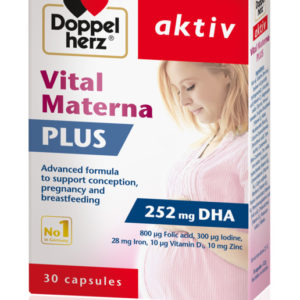Folic acid is a water-soluble B vitamin that is indispensable for all of the growth and development processes in the body. Together with vitamin B12, folic acid is essential for the formation of red and white blood cells as well as for the production of blood platelets which are necessary for blood clotting.
Importance during pregnancy
Folic acid is probably the most well-known vitamin when it comes to the topic of pregnancy. Folic acid is increasingly needed from the beginning of pregnancy. The requirement increases by twice as much as the normal requirement and is approximately 800 µg (0.8 mg) per day during pregnancy. Folic acid contributes to normal cell division and maternal tissue growth, but also ensures that a baby has enough “material” for cell structure. Of course, this is particularly the case during pregnancy, where one cell starts to develop at the beginning of pregnancy into a human with approximately 100 billion cells! That is why folic acid is also important for neural tube closure and therefore for a positive course of pregnancy. Since the closure of the neural tube already occurs at the beginning of pregnancy, i.e. at a time when women are often not yet aware of their pregnancy, an adequate supply of folic acid should already be kept in mind with an existing desire to have children.
Cardiovascular protection
Another important function of folic acid is the protective effect on the cardiovascular system. Together with the vitamins B6 and B12, folic acid provides a contribution towards normal homocysteine metabolism. Homocysteine is an undesirable, harmful intermediate product in the protein metabolism. It is considered to be unfavourable for vascular health due to its oxidising properties. That is why today researchers already tend to specify the limit at 10 µmol/litre of blood.










